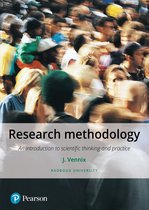Samenvatting
Summary Methods of Research and Intervention (book Vennix)
- Instelling
- Radboud Universiteit Nijmegen (RU)
- Boek
- Research methodology
Samenvatting van alle hoofdstukken van het boek "Research Methodology" geschreven door J. Vennix (editie: 2019). Zelf heb ik een 8.5 gehaald met deze samenvatting. Summary of all chapters of the book “Research Methodology” written by J. Vennix (edition: 2019). I passed the course with an 8.5 ...
[Meer zien]





